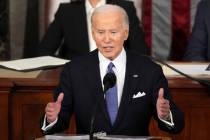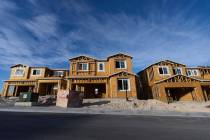LETTERS: NV Energy-rooftop solar battle needs balanced solution
Fairness in solar
Energy has been a big topic of discussion over the past few months, and NV Energy has taken the brunt of a lot of criticism, particularly from some in the rooftop solar industry. What’s been conveniently left out by the solar folks is the service obligation that all of our public utilities have and the rules they must abide by.
It’s opportunistic for NV Energy’s detractors to use the monopoly-and-competition argument to suit their immediate needs on net metering, because they don’t have an obligation to serve. Don’t be fooled. Solar companies are for-profit businesses. However, there are no rules for them to follow, as they are not regulated. Their business models are built on tax incentives and subsidies, and they need the local utility’s grid in order to be successful. Talk about biting the hand that feeds you.
These subsidies have a direct impact on those who can’t afford it, don’t qualify to participate or simply choose not to invest in rooftop solar. That includes small businesses and low-income residents, particularly in minority and disadvantaged communities that might already be struggling.
No doubt the energy business is changing and utilities should look at ways to adapt to an evolving market. Nevertheless, they are an easy target. The Monday morning quarterbacking is short-sighted. Utilities don’t have a choice, either. If you want power when it’s dark or on a cloudy day, they have to be ready to supply it. Whether you turn on one light or 20, they have to be able to handle the 20.
So before we condemn NV Energy for seeking a fair and reasonable outcome for all customers, let’s take a look at the bigger picture, not just what the rooftop solar industry wants today. We all agree that solar energy is a vital natural resource in Nevada. But instead of making this a dogfight, the rooftop solar industry should present a balanced solution that keeps the lights on at fair prices for everyone.
Otto Merida
Maggie Arias Petrel
Las Vegas
Mr. Merida is president and CEO of the Latin Chamber of Commerce. Ms. Petrel is chairwoman of the board for the Latin Chamber of Commerce.
Business coverage
I have read the Review-Journal for 10 years. I used to love the Sunday Business section. It was my favorite part of the paper. But I have given up looking forward to it.
On Nov. 15, it featured the UNLV football coach creating a buzz (“Rebel-Rouser”). Maybe this is big business, but it sounds like sports. There were also articles on Scientific Games Corp. spending $8 billion, Sheldon Adelson courting influence with Georgia conservatives (sounds like politics) and a Q-and-A with a firefighter (human interest story).
Tesla is building a huge plant in the Reno area. How is that going, and how is it impacting the area? There is talk of a car plant in Apex, but there are some infrastructure problems. How could North Las Vegas get those corrected, and is anyone working on those issues? Republic Services opened a new waste sorting and recycling plant that got raves. What does this mean to all of us and the landfill that could fill up one day soon? Is there a building push going on for apartments? How is the housing market doing? What is the water district’s plan for the ranches they bought for water rights, now that the new Lake Mead straw is pulling water? What does the loss of the Riviera mean to the north Strip?
The Fontainebleau went up for sale. Who might be interested in buying it, and what would it take in investment to finish it? Is there room for more beds in Las Vegas? The Las Vegas Monorail president says it’s financially feasible to run the train to Mandalay Bay, but not 500 more yards to the airport. What might be the best way around height restrictions at the airport that could make this happen? When will the monorail go to downtown? Isn’t this common sense? If not, why not?
There used to be investment advice on mutual funds and good articles about up-and-coming stocks. What happened to those? What should we investors be doing to prepare for more or recurring Greek defaults? Breaking up the big Wall Street banks was discussed in the Democratic debate. What does that mean for Americans and businesses? Maybe it’s time to return to your old way of doing things. The recession is over.
Glenn Parrent
Las Vegas


















